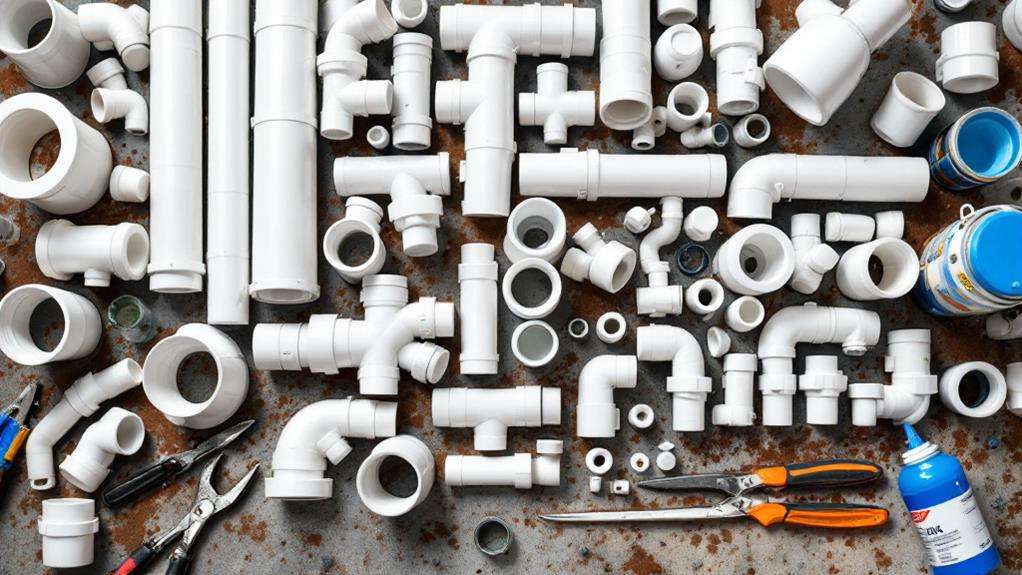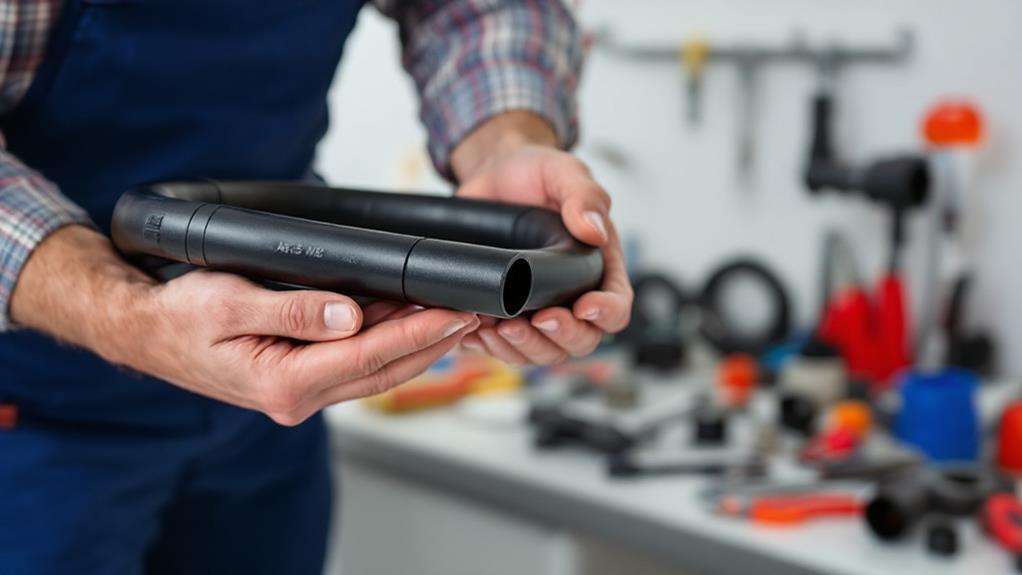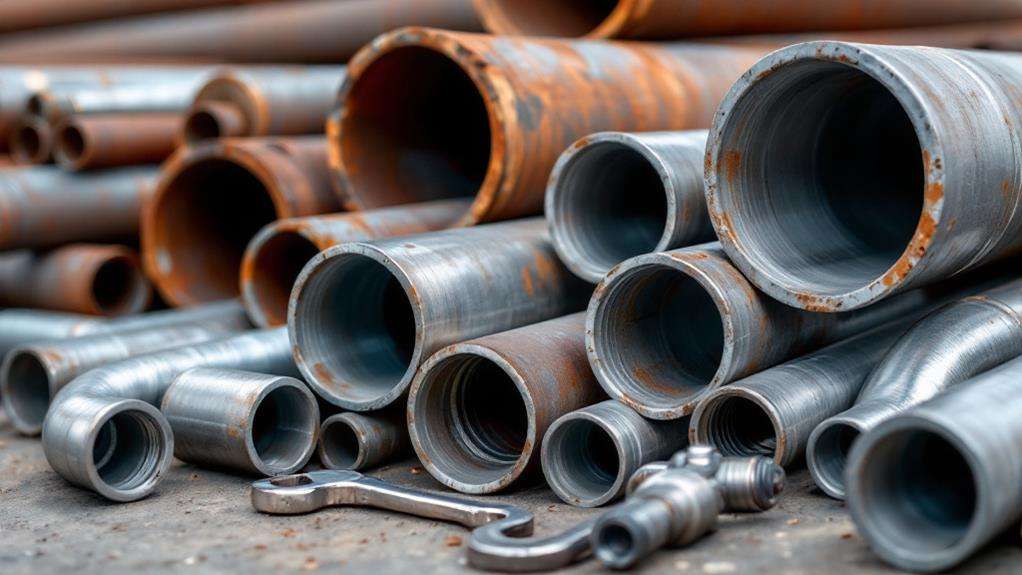Types of Pipes for Home Plumbing: A Complete Guide
When choosing pipes for your home plumbing, you'll encounter several options. Copper pipes are reliable and long-lasting, while PEX offers flexibility and durability. PVC is cost-effective for drain systems, and CPVC withstands higher temperatures. ABS pipes excel in waste management, and cast iron provides exceptional longevity. Galvanized steel resists corrosion but may require replacement after a few decades. Each type has its strengths and ideal applications, so consider factors like cost, durability, pressure rating, and ease of installation. Understanding these options will help you make an informed decision for your home's plumbing needs.
Copper Pipes: The Reliable Classic
Reliability stands as the hallmark of copper pipes in home plumbing systems. You'll find these durable components in countless households, often lasting over 50 years with proper care. Copper's non-permeable and bacteria-resistant properties make it an excellent choice for your potable water supply, ensuring safe drinking water for your family.
When you're considering plumbing options, you'll appreciate copper's versatility. It's available in sizes ranging from 1/4 inch to 12 inches, accommodating various needs in your home's water system. You'll commonly see copper pipes used for both hot and cold water lines, as well as in HVAC systems.
Copper's sustainability is another advantage you shouldn't overlook. As a recyclable material, it contributes to eco-friendly building practices, allowing you to make a responsible choice for your home's infrastructure.
In your plumbing system, copper pipes excel in providing clean water efficiently. Their durability means fewer replacements over time, saving you money and hassle. Whether you're building a new home or updating an existing one, consider copper pipes for their proven track record in residential plumbing applications.
PEX Pipes: Flexible and Durable
While copper pipes have long been a staple in residential plumbing, PEX pipes have emerged as a popular alternative in recent years. These flexible and durable pipes are made from cross-linked polyethylene, offering several advantages for your home's water supply system.
PEX pipes are resistant to scale, chlorine, and corrosion, making them a long-lasting option for both hot and cold water lines. Their flexibility allows for easier installation, as you can route them through walls, ceilings, and crawlspaces with fewer fittings than rigid pipes. This can save you time and money during the installation process.
Available in sizes ranging from 1/4 inch to 1 inch, PEX pipes are suitable for various residential plumbing applications. They're particularly useful in areas prone to freezing temperatures, as their flexibility helps prevent bursting. However, it bears mentioning that some concerns exist regarding potential chemical leaching from PEX pipes, though research on long-term health effects is ongoing.
When considering PEX for your home's plumbing, weigh the benefits of its durability, flexibility, and ease of installation against any potential drawbacks. Consult with a professional plumber to determine if PEX pipes are the right choice for your specific needs.
PVC Pipes: Affordable and Versatile

For many homeowners, PVC pipes have become a go-to choice for residential plumbing, particularly in drain, waste, and vent systems. These affordable and versatile plumbing pipes offer several advantages that make them popular among DIY enthusiasts and professional plumbers alike.
PVC pipes are lightweight, corrosion-resistant, and simple to install, making them a cost-effective option for various plumbing projects. You'll find them commonly used in drain lines and other non-pressurized applications. Their distinctive white or gray color makes them easily identifiable, helping you differentiate them from other plumbing materials.
While PVC pipes can withstand a wide temperature range, they're not suitable for hot water supply lines due to the risk of degradation over time. It's critical to recognize that PVC can become brittle and crack when exposed to direct sunlight or extreme cold, so proper insulation and protection are indispensable for longevity.
When considering PVC for your plumbing needs, remember that it's best suited for cold water applications and drainage systems. Its durability, affordability, and ease of installation make it an exceptional choice for many residential plumbing projects, but always consult local building codes to guarantee compliance with regulations.
CPVC Pipes: Heat-Resistant Alternative
When PVC pipes fall short for hot water applications, CPVC pipes step up to the challenge. As one of the most versatile types of pipes used in home plumbing, CPVC is suitable for hot water and cold water supply systems alike. You'll find that CPVC pipes are an excellent choice for your main water supply, offering superior heat resistance compared to standard PVC.
CPVC pipes are made from durable materials that can withstand higher temperatures, making them ideal for use in your home's hot water distribution. They're also resistant to chemical damage and corrosion, guaranteeing long-lasting performance in various plumbing scenarios. When it comes to installation, you'll appreciate how easy it is to work with CPVC. The solvent welding process creates strong, leak-free connections that contribute to the overall reliability of your plumbing system.
While CPVC pipes offer many advantages, it's crucial to recognize that they can become brittle over time. To maintain their performance, you should conduct regular inspections. Despite this consideration, CPVC remains a cost-effective alternative to copper pipes, providing similar durability and temperature resistance for your home plumbing needs.
ABS Pipes: Impact-Resistant Option

As you investigate impact-resistant options for your home's plumbing, ABS pipes stand out as a sturdy choice. These pipes, made from Acrylonitrile Butadiene Styrene, are primarily used for drain, waste, and vent (DWV) applications in residential and commercial settings. Unlike other types of pipes, such as cast iron pipes or steel, ABS pipes are lightweight and easy to install.
You'll recognize ABS pipes by their distinct black or dark gray color. They're commonly used for underground piping and indoor drainage systems. While they're not approved for potable water lines, ABS pipes excel in handling waste and drainage. Their strength and impact resistance make them less prone to cracking or breaking compared to other materials like PVC.
One of the advantages of ABS pipes is their ability to withstand higher temperatures than PVC. This makes them suitable for both hot and cold water applications in your home's plumbing system. Additionally, ABS pipes are resistant to common household chemicals, ensuring longevity and reliability in various plumbing scenarios. When considering durable options for your home's drainage needs, ABS pipes offer a solid and versatile solution.
Cast Iron Pipes: Long-Lasting Strength
While ABS pipes offer impact resistance, cast iron pipes stand out for their exceptional longevity and strength. Known for their durability, these pipes can last up to a century with proper maintenance, rivaling other durable materials like copper and stainless steel. You'll appreciate their resistance to freezing temperatures, making them ideal for colder climates. Guarantee proper ventilation to maximize their lifespan.
Cast iron pipes' sound-dampening properties provide a quieter plumbing experience, reducing noise from running water. Although they're more expensive initially, their longevity and low maintenance requirements offer long-term cost savings. However, be aware that these pipes are heavy and difficult to install, often requiring specialized tools and techniques.
Unlike pipes that easily bend around corners, cast iron's inflexibility can pose installation challenges. But don't let this deter you – their corrosion resistance and durability make them an excellent choice for many homes. Remember to insulate exposed cast iron pipes in colder areas to prevent heat loss and potential freezing. While they won't reduce water flow like some materials, their strength and longevity make cast iron pipes a reliable option for your home's plumbing system.
Galvanized Steel: Corrosion-Resistant Choice

Galvanized steel pipes have long been a popular choice for home plumbing systems, especially in older homes. This type of plumbing pipe is coated with a layer of zinc, making it resistant to rust and corrosion. The main use for galvanized steel pipes is in cold water lines, where they've proven to be durable and long-lasting.
If you have an older home, you're likely to find galvanized steel within your plumbing system. These rigid pipes can withstand high pressure and are suitable for various applications, including drainage and gas lines. However, it's vital to note that even with their protective zinc coating, galvanized steel pipes can eventually succumb to rust and corrosion over time.
To guarantee the safety and efficiency of your plumbing, regular inspections are essential. If you notice signs of wear or low water pressure, it may be time to consider replacing your galvanized steel pipes. While they're no longer commonly used in new construction, you can still repair or replace them with modern materials like copper, PEX, or PVC. Always consult your local building codes when making changes to your plumbing system to ensure compliance and optimal performance.
Choosing the Right Plumbing Pipe
Selecting the appropriate plumbing pipes for your home isn't a one-size-fits-all decision. You'll need to ponder various factors when choosing the right pipe material for your water pipes and plumbing fixtures. Cost, durability, pressure rating, temperature rating, and ease of installation are all essential elements to keep in mind.
Copper pipes are a reliable choice for potable water applications due to their durability and non-permeability. If you're looking for flexibility and resistance to scale and chlorine, PEX pipes might be your best option. For a lightweight and corrosion-resistant option, PVC pipes are a popular choice, but they're not suitable for hot water. In that case, CPVC pipes can withstand higher temperatures and are appropriate for potable water distribution.
When making your decision, contemplate the specific requirements of your application. Think about the water temperature, pressure, and flow you'll need. Don't forget to factor in the overall cost and ease of installation. By carefully evaluating these aspects, you'll be able to choose the plumbing pipe that best suits your home's needs, ensuring a reliable and efficient water system for years to come.
